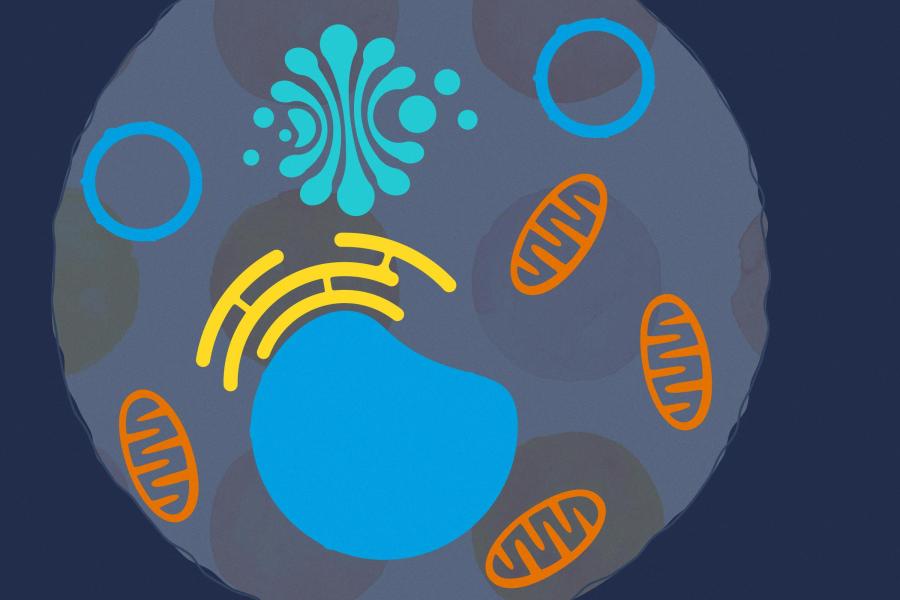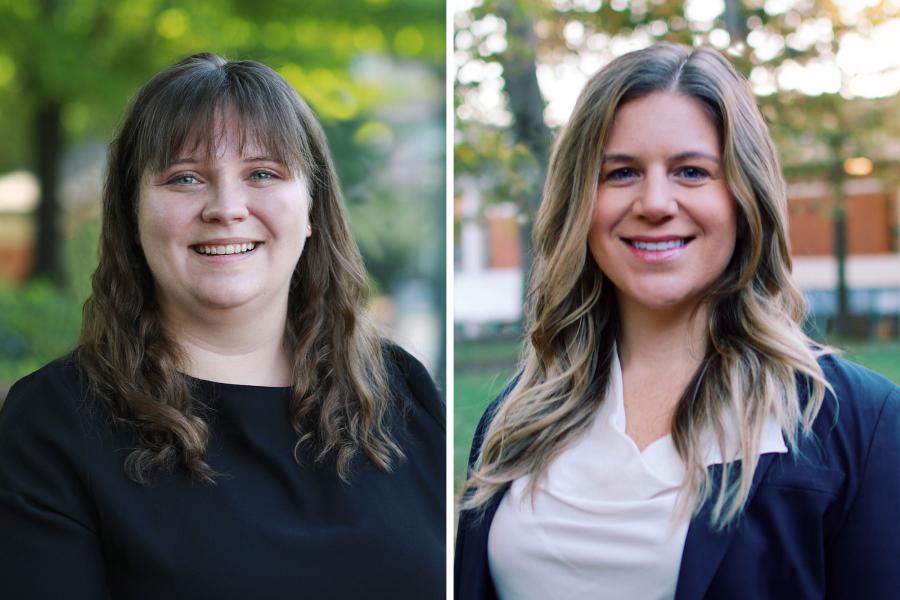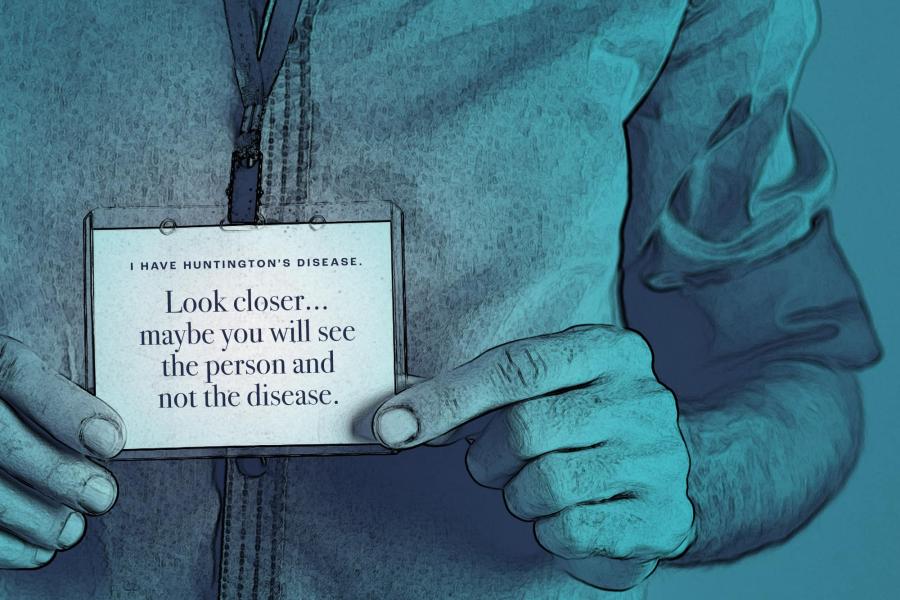Some recipients of the University of Virginia’s Hoos Building Bridges Awards this year stepped up during the pandemic and helped the University meet unprecedented challenges. Others are making progress in several of UVA’s strategic areas, from anti-racism efforts to sustainability improvements.
The awards celebrate cross-disciplinary partnerships and projects among UVA employees, and honor recipients for their leadership, collegiality and efforts in establishing strong relationships that help get things done across Grounds. This time, 11 individuals and two teams have received the award and will be honored at a reception later this summer.
The University launched the awards in 2019, building on a vision UVA President Jim Ryan outlined in his first Opening Convocation address – a University community of people who, when in doubt, “build a bridge.”
“I’ve been incredibly impressed with the individuals and teams recognized with the Hoos Building Bridges Award this year,” Ryan said. “Each awardee has demonstrated outstanding leadership in working across traditional boundaries in ways that strengthen and advance our work as an institution – regardless of the department, school or division they serve.
“Our staff is among the most dedicated and talented in all of higher education,” he added, “and it’s an honor to recognize their accomplishments in this way.”
This year’s honorees:
• Matt Burgess, assistant director of learning technology initiatives, Center for Teaching Excellence.
With the proliferation of digital technology to enhance teaching and learning, it can be difficult for individual professors to figure out what might work best. The Center for Teaching Excellence hired Burgess in March 2020 as its inaugural assistant director of learning technology initiatives to improve that situation.
Since then, Burgess has created partnerships with colleagues across Grounds on several important projects related to the selection, implementation, promotion and support of learning technologies at UVA.
Burgess revised and expanded the center’s Learning Tech website, designed to help connect instructors with the most appropriate tools for their teaching needs. He has also added a review process for new technology to ensure that tools are accessible and secure at UVA.
“Being housed within a centralized and pan-University unit like the Center for Teaching Excellence has given Matt the unique opportunity to provide support to and engage with faculty, staff and students in every corner of the University,” wrote nominator Kristin Sloane, marketing and communications specialist for the center.
• Carri Burgjohann, manager, Office of Youth Protection, Department of Safety & Security.
UVA hosts programs for youth from the Grounds to UVA’s College at Wise, serving thousands of children. In the last two years, Burgjohann has been building bridges across the University and in the greater Charlottesville community with the goal of supporting programs and camps delivering safe and fun programming to youths from 6 to 17, virtually and in person.
• Kayla Calvo, business administrator, iTHRIV, School of Medicine
Calvo goes beyond managing finances for the integrated Translational Health Research Institute of Virginia. Recently, she developed a mentoring and support program for grant administrators across the University to support onboarding and to develop education resources, as well as mentoring.
Her goals included creating a sense of community and set of best practices among research administrators who are spread across UVA, including the newest school, the School of Data Science.
This innovative program has gotten national recognition after Calvo shared the program at conferences, her nominators wrote.
• Mike Duffy, manager, Transportation Operations and Fleet, UVA Facilities Management.
Convinced that Facilities Management could improve upon its sustainability and safety, Duffy, the transportation operations and fleet manager, initiated a project two years ago to develop training for UVA Facilities Management’s workers who drive more than 250 different kinds of vehicles, including carts, cars, vans and trucks.
Duffy turned to B. Brian Park, a professor of engineering systems and environment in the University’s School of Engineering, to see if they could work together. Park uses technology solutions to research and improve efficiency and safety of transportation systems on the road.
While Duffy collected and provided the data from Facilities Management, Park designed an Engineering School capstone project for students to analyze the data and make recommendations for saving fuel, such as not idling a vehicle, accelerating more slowly and reducing use of air conditioning. Duffy implemented the training module as well as a refresher workshop with these and other suggestions to reduce fuel use and other small actions that have resulted in significant savings.
During the pandemic over 2020-21, Duffy conducted the training mostly online. The changes enabled Duffy to pursue what’s called “Sustainable Fleet Accreditation,” with UVA becoming the only active university fleet in Virginia to receive this designation.
“Many universities, including UCLA, wanted to learn how we implemented such a training program,” Park said. “Mike was the key person in every step of the process.”
• Diane Farineau, director, Office of Graduate Medical Education, School of Medicine.
Farineau serves as the interface between the UVA Medical Center and School of Medicine for all issues related to graduate medical trainees, or residents and fellows who straddle the categories of student and employee. Those details include their licensing and privileges, benefits, payroll, quality improvement and even immigration services or parenting resources. She also regularly provides guidance and faculty development for the Graduate Medical Education program directors.
Her connections extend further within the University and to underrepresented students at schools outside of UVA, especially historically Black colleges and universities.
Across Grounds, she is a member of the Diversity Council, the Women’s Leadership Council, the UVA Family Support Collab on child care, and the Title IX panel.
“Diane serves as the bridge to other medical education communities by supporting outreach efforts” for recruiting students to UVA’s graduate medical education programs, nominator and associate dean Dr. Susan Kirk wrote. She often takes on the role of confidante for those with whom she works, celebrating their successes and providing comfort when needed, Kirk said, adding that they have worked together 15 years.
• Melissa Henriksen, director of operations, National Security Policy Center, Frank Batten School of Leadership and Public Policy.
When the University needed someone to set up a COVID-19 saliva-testing lab, Henriksen rose to the challenge. Although she was a project manager for research initiatives in the area of national security, she had previously been a scientist and knew how to set up a lab.
Her work in fall 2020 involved renovating an area in the UVA Medical Center for the testing facility and assembling a team of 16 workers. By the spring semester of 2021, the lab processed about 4,000 tests per day, with the help of a robot to speed the process. She also oversaw the inventory of millions of dollars’ worth of testing supplies and reagents.
Henriksen “made a direct contribution to keeping the University of Virginia open and limiting the spread of COVID-19 before widespread vaccinations were available,” Philip Potter, associate professor of politics and public policy, wrote in nominating her. She now works for Potter, who directs the Batten School’s National Security Policy Center.
• Beth Jaeger-Landis, acute care nurse practitioner, UVA Health University Medical Associates Internal Medicine Clinic.
Jaeger-Landis, who has been at UVA more than 20 years and provides primary care and women’s health care services, makes UVA feel like “home” to patients in the wider UVA, Charlottesville and Central Virginia community.
“She is a bridge to health, wellness and person-centered care,” nominator K. Jane Muir, an emergency room nurse practitioner, wrote. Jaeger-Landis accompanies her patients to the clinic for routine visits, assists them when they have been admitted to the hospital and visits them at home.
• Meg Kennedy, curator of material culture, Albert and Shirley Small Special Collections Library.
Kennedy is responsible for the art, furniture and other items placed in the pavilions on the Lawn. Her duties also include the stewardship of the Flowerdew Hundred Collection that contains some of the earliest known artifacts from colonial Virginia. To ensure the most accessibility for these materials, Kennedy regularly works with colleagues from the Fralin Art Museum, the Kluge-Ruhe Aboriginal Art Collection, Monticello and other cultural heritage institutions in the region, the state and the country.
• Danae Polemi, travel and expense programs analyst, Procurement and Supplier Diversity Services.
Polemi has worked with colleagues across Grounds to help promote understanding and adoption of the Travel UVA program. Since joining UVA in August 2020, she has developed relationships with users in many schools and units. Polemi tracked and facilitated the use of hundreds of thousands of dollars of unused ticket credits from trip cancellations due to COVID-19 and UVA’s travel restriction.
• Kathleen Rea, adult health clinical nurse specialist, School of Nursing.
As a clinician educator, Rea bridges the gap between optimizing educational outcomes at the UVA School of Nursing as well as optimizing clinical outcomes at UVA Health.
Especially during the pandemic, her support of students, faculty, the Nursing School and the teaching and learning mission were critical to getting nursing students across the finish line so they could be prepared for licensure and practice. That was especially important because nurses are needed now perhaps more than ever, noted nominator Regina DeGennaro, a nursing professor.
• Abby Self, senior assistant dean of academic operations and strategic initiatives, School of Nursing.
Self had the responsibility of ensuring that everyone in the Nursing School could understand rapidly changing policies and actions required in responding to the pandemic. This included student protection, testing, contact tracing, compliance with policies, and vaccination.
Self helped develop notification procedures, plus revisions and updates as conditions changed, and also covered the detection, reporting and instructions given to students, faculty and staff who tested positive for COVID-19, while maintaining confidentiality.
“Her extraordinary efforts helped shape better processes and assured accurate data were collected and reported so that we could meet requirements for expected vaccination across many months with changing policies,” nominator Pamela Cipriano, dean of the School of Nursing, wrote.
Hoos Building Bridges Team Awards
• Claire Downey, media team manager, and Elizabeth Marshall, senior project coordinator, Weldon Cooper Center for Public Service.
Participating in a book club about anti-racism convinced Downey and Marshall they could take this diversity activity to a higher level. Downey and Marshall launched an Equity and Antiracism Planning Committee, drawing members from 10 units under the vice provost for academic outreach.
They include employees from the Cooper Center and several other groups housed within, such as the Sorensen Institute for Political Leadership and the Center for Survey Research, plus the Virginia College Advising Corps, the Center for the Liberal Arts, and Virginia Humanities.
Impressed with their commitment, the Cooper Center’s associate director, Michael W. Phillips, nominated them for this award.
“They are passionate about this work and they took it on themselves to make a difference,” Phillips wrote, adding that the committee is not a mandate. “They are dedicated public servants, and I feel that this work is a strong example of their hearts and collaborative efforts.”
The group has begun meeting, aiming to provide a forum to discuss topics and training related to equity and inclusion, as well as supporting the University’s efforts. Those topics, among others, will explore the roles of anti-racism, gender equity, class equity, regionalism and accessibility in public service, education and outreach.
• UVA Cancer Center’s Colorectal Cancer Screening Team: Dr. Cynthia Yoshida, Division of Gastroenterology/Hepatology; Wendy Cohn, associate director of community outreach and engagement; Lindsay Hauser, director, Office of Community Outreach and Engagement; Erin Kennedy, research specialist; Ann S. Rigdon, nurse administrative coordinator (now retired); and Shari L. Stanley, nurse administrative coordinator.
Colon cancer is the No. 2 cause of cancer death in the U.S., according to UVA Health. There’s good news, however: More than half of these deaths can be prevented with screening. Along with finding colon cancer, screening also detects precancerous polyps.
For almost five years, the revamped Colorectal Cancer Screening Program has grown to include initiatives at UVA, in the local region and across the commonwealth. Stanley, a nurse administrator, had worked with the team since 2019 and not only nominated it, but also joined it earlier this year.
Through the team’s efforts, UVA signed on to the American Cancer Society’s pledge to screen “80% in Every Community,” targeting UVA employees first. They sought out best practices and introduced an opportunity for employees to get screened during March’s Colorectal Cancer Awareness Month. Current data shows an increase in colorectal cancer screenings of as much as 200% at one of UVA’s clinics.
Developing research and screening programs, the team also created a website, educational brochures and designated a nurse to respond to patient queries. One of the objectives was to increase the use of an at-home test, known as the FIT test. The nurse can determine if a patient is eligible to do this or should get a colonoscopy.
“Colon cancers have been prevented and lives have been saved as a direct result of these efforts,” Stanley said.
Media Contact
University News Associate Office of University Communications
anneb@virginia.edu (434) 924-6861
Article Information
June 30, 2025




